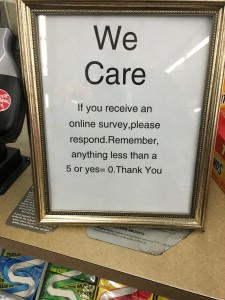 Two competing trends are on a collision course, one primarily external and the other internal.
Two competing trends are on a collision course, one primarily external and the other internal.
Will we experience a multi-car crash or a capitulation?
The “saccharine surplus” movement—as I’ve named it─is the tendency for companies to strong-arm customers to say not just kind but awesome things about them.
If you shop at CVS, get your vehicle serviced at a car dealership or take classes at Trump University, you’ve probably experienced this phenomenon.
The customer-facing employees, or instructors in the case of Trump University, tell you that you must give them the highest ratings possible when you complete your post-purchase/service survey, because nothing lower will count. (CVS provides a sign.)
If you choose lower scores, the consequences could be horrible. The employees could lose their job, opportunities to earn a bonus and the respect of their parent organization.
Or who knows? Maybe these employees could even have their fate put to a vote, to live or die, a la Larry the Lobster, as Eddie Murphy did on an old Saturday Night Live skit.
We customers probably have more empathy toward our fellow humans than a crustacean, especially one that’s a delicacy when served with clarified lemon butter.
Sticking with this food theme though, the spoonful of fake sugar embedded in this “saccharine surplus” movement still doesn’t make the medicine go down well.
As John Hunter observed after I posted the CVS sign pictured above on Twitter, “It is pitiful disrespect for customers when you tell them they must lie because of the measurement the business does.”
It’s not just the lying. It’s also the violation of personal values. If you believe in transparency as well as continuous improvement, as I do, it’s repulsive to sugarcoat bad news.
And what about those customers who work for employers who practice a “culture of candor”? When you speak truth to power, especially powerful leaders, you don’t feel like blatantly lying about services that don’t wow.
Then there are employees who work for companies that have embraced a small albeit growing trend to practice “radical candor,” also referred to as “front-stabbing” or “mokita.” (“Mokita” is a New Guinea word meaning “a truth everybody knows but nobody speaks.”)
“Radical candor” takes a “culture of candor” to the next level in which employees are encouraged and expected to “drop the polite workplace veneer and speak frankly to each other no matter what,” as described in this Wall Street Journal article ‘Nice’ Is a Four-Letter Word at Companies Practicing Radical Candor.
By being forthright rather than indifferent or worse, positive about negative behavior, employees can address issues with each other early on before they become problematic down the road. The point of candid conversations is to share the good, bad and ugly in a constructive, not destructive, manner.
Once employees get comfortable being direct with each other, do you really think they’re going to want to lie about their less than excellent customer experiences either work or non-work related?
No, they’ll probably want to go post their reviews on Yelp, TripAdvisor, Amazon or wherever they can voice their opinions. Reviews on these sites are generally more believable than testimonials on companies own websites. And if companies want to believe their own testimonials and Net Promoter Scores gathered under duress, let them wallow in la-la land.
Because individuals have so many options for speaking these days, I’m hopeful that we the people can overcome these stuck-in-the-La Brea-tar-pits companies that try to stifle the truth in favor of a saccharin rush.
Will you join me in practicing radical candor to push aside the saccharine surplus especially when it’s sugarcoating reality?

0 Comments